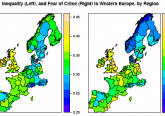![DWlogo3-194px[1]](http://politicsinspires.org/wp-content/uploads/2013/01/DWlogo3-194px1.png) The call of protest movements such as Occupy for recognition of the gulf in influence and economic resources between the super-wealthy (the 1 per cent) – to whom the causes of the financial crisis are usually attributed – and the rest of us (the 99 per cent) resonates with republican concerns. It draws attention to the failure of Western societies to uphold popular sovereignty and maintain social cohesion, as the gap between ‘them and us’ becomes far too great. Only the 1 per cent, so the argument goes, genuinely experiences the kind of freedom that liberal democracy promises to every individual. The rest of us are in chains, condemned to the whims of an out-of-control, unaccountable and excessively remunerated financial sector.
The call of protest movements such as Occupy for recognition of the gulf in influence and economic resources between the super-wealthy (the 1 per cent) – to whom the causes of the financial crisis are usually attributed – and the rest of us (the 99 per cent) resonates with republican concerns. It draws attention to the failure of Western societies to uphold popular sovereignty and maintain social cohesion, as the gap between ‘them and us’ becomes far too great. Only the 1 per cent, so the argument goes, genuinely experiences the kind of freedom that liberal democracy promises to every individual. The rest of us are in chains, condemned to the whims of an out-of-control, unaccountable and excessively remunerated financial sector.
Scrutiny of the super-wealthy is of course welcome, and long overdue. However, as a way of challenging the complex array of social and economic ills implicated in the financial crisis, and emanating from it, a republicanism based on the 99 per cent slogan will not work. A slogan originally coined primarily to draw attention to recent trends in the distribution of income in the USA, will fail, for instance, to provide an account of the UK’s extensive and endemic inequality of wealth. Accepting this slogan risks failing to learn from a rich republican tradition, whose insights are relevant to many of the social and economic problems being encountered today, not simply the emergence of a super-wealthy economic elite.
Let’s take a look at the actual wealth holdings in the UK, as recorded in theWealth and Assets Survey (WAS). Here we can see that the mean level of household total wealth is £418,000, with a median figure of £235,000. There are huge numbers of households with wealth beyond these amounts. 9 per cent have wealth of £1 million or more – yet nine in ten of these households belong to the 99 per cent. A further 11 per cent have wealth between £600,000 and £1 million, and 8 per cent have between £450,000 and £600,000.
Around a third of households have wealth holdings that we might think of as ‘typical’ – from just below the median, to just above mean. This is actually a remarkably small proportion. In reality, almost one in four households have wealth of less than £150,000 (barely a third of mean wealth holdings), including 20 per cent with less than £40,000 (less than a tenth of the mean). The bottom line is that more than a quarter of households, not 1 per cent, have wealth far beyond the reach of most people. And a fifth of households are more poor than most of us can probably comprehend.
Of course, the life-course nature of wealth accumulation means we can usually expect wealth holdings to increase with age, so those in the lowest wealth bands will tend to be younger. True to form, 60 per cent of households headed by someone aged 16-25 have wealth below £150,000 – but so too do 40 per cent of households headed by someone aged 35-44. Viewed from the other direction, it is only in the top two wealth bands (with wealth above £600,000) that 55-64 year-olds significantly outnumber 35-44 year-olds. Age is not therefore a sufficient explanation for the vast wealth inequalities evident within the UK.
So far as wealth inequality is concerned, therefore, the depiction of the 99 per cent versus the 1 per cent is an unfortunate simplification of our divided society. There is immense diversity of living standards and life chances, as shaped by ownership of assets, within the 99 per cent. Even if we acknowledged that the 99/1 split is more rhetorical than an attempt to accurately represent the reality of inequality in Western countries like the UK – and I agree it makes a good slogan – a more realistic split such as 80/20 would still be far too crude. Inequalities within the 80 per cent, especially in terms of how they impact upon everyday life, are arguably greater or more important than those between the 80 and 20 per cent.
Consider the opening paragraph of Occupy London’s ‘About’ page which states:
It’s been four years since the financial crisis hit. Governments have failed catastrophically to implement the economic change needed to prevent it happening again. They have failed to protect their citizens’ interests against those of corporations and the financial markets. Ordinary people – families, small businesses and communities – are being forced to pay for a crisis they didn’t cause.
From a progressive perspective, there is much to support in such a statement. But, as we can see from the facts about wealth inequality noted above, the implied community of interest among all ‘citizens’ and ‘ordinary people’, contrasted with the faceless villains of ‘corporations and financial markets’, is a gross simplification.

To expand further on this point, it is far from the case that everyone within the 99 per cent (or, indeed, 80 per cent) has a fairly similar standard of living. Coffee shops, gym memberships, smartphones, Premier League football, even trips to the cinema or eating out at a restaurant – these are not goods that are universally accessible to all. We must not buy into the myth that such things are easily compatible with the household budgets of ‘ordinary’ families. A six-fold increase in the number of people relying on food banks represents a disturbing intensification of this problem.
Jessica Kimpell’s excellent contribution to the Democratic Wealth series challenges republicans to consider the constraint that living in a market-based society poses for the development of republican virtues. But equally, we might consider what role republican ideas, and campaigns, can play in actually enabling the have-nots to be meaningfully included in the consumer economy, rather than merely window-shopping or relying on the charity of those that have. It is true that middle-class living standards are not keeping pace with the extremely rich, but that is not justification to marginalise the plight of those that are (and always have been) even further behind.
Given the republican interest in social cohesion, and given its necessity for genuine democracy, it is similarly disappointing that republicans have thus far largely overlooked cultural relations between the have-nots and the majority group. It is not an exaggeration to say that impoverishment is depicted by many as sub-human, or certainly sub-citizen. The poor are thus rendered incapable of virtue and unworthy of support from society in general. Such representations are hardly confined to dinner party chatter among the wealthiest 1 per cent, or 20 per cent, but rather are widespread throughout popular culture. The cause of addressing this has been taken up by social democrats, notably Owen Jones, but how far has it struck a chord with new protest movements such as Occupy? It is hard to imagine how a common good can be imagined and pursued while this demonisation goes unchallenged.
It is of course positive that anti-finance protest movements have voiced in the mainstream media the idea that the super-wealthy are not like the rest of us. There are commonalities of interest among everyone outside the highest elite that should be explored and built upon. But the essential truth that needs to be recognised by the protestors, and others, is that the apparent loss of popular sovereignty experienced since the City and Wall Street’s influence expanded from the 1980s onwards has in fact been a permanent feature of the democratic experience of the poorest groups in our society. The story that needs to be told, therefore, is not necessarily one of the super-wealthy stealing our rights and liberty, but rather one of the traditional middle-classes increasingly joining the ranks of the poor and discovering what it really means to live without the financial security that affords effective civic participation. There has always been a group for whom the promise of liberal democracy has meant very little – and that group is getting bigger.
This is the second of three pieces exploring wealth distribution in Britain. It sits within our Democratic Wealth debate, in partnership with OurKingdom. See the first piece, on wealth distribution and Occupy, ‘Getting involved with the policy commission on UK wealth distribution‘, by Karen Rowlingson.







No Comment